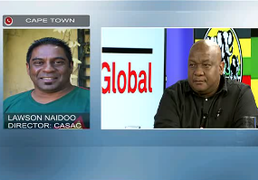SUNDAY marked the end of a 95-year journey for former president Nelson Mandela, President Jacob Zuma said at his state funeral in Qunu in the Eastern Cape.
"It is the end of 95 glorious years of a freedom fighter, a dedicated, humble servant of the people of South Africa, a fountain of wisdom, a pillar of strength and a beacon of hope," he said. "We are truly honoured to be part of the final journey of this great son of our country and the founding president of a free and democratic South Africa."
He said that when Mandela became critically ill last year, people had not wanted to confront the reality of his mortality, which had now come to pass.
"Tata, it has been a long, painful week for us, your people, your comrades, your relatives and your friends, since you took your last breath on December 5," Mr Zuma said.
People around the country had expressed their grief in various ways. "What truly stands out is the spectacular display of admiration by the thousands that descended on the Union Buildings to spend just one minute with you as you lay in state."
Mourners had lined the streets of Pretoria on Wednesday, Thursday and Friday, some silent, some singing and some crying.
"We wish today to express two simple words," said Mr Zuma. "Thank you. Thank you for being everything we needed and wanted in a leader during a difficult period in our lives."
Mr Zuma undertook to take forward Mandela’s legacy, saying the late leader had made tremendous strides in gender equality, giving it prominence and seriousness under his presidency.
"(This led) to an increase in the number of women in public office, especially Parliament and Cabinet," he said. "We dare not reverse your achievements in this regard.
"As your journey ends today, ours must continue in earnest. One thing we can assure you today, Tata, as you take your final steps, is that South Africa will continue to rise."
The president said South Africans could not rest until the poor and working class had truly benefited from the fruits of freedom and democracy for which Mandela had fought.
"Therefore, today we undertake to take forward the (promise) of an improved quality of life for all," Mr Zuma said. "We commit to work more intensely to deal a decisive blow against persisting poverty, unemployment, and inequality.
"We pledge to take your vision forward for good schools, hospitals, quality housing, utilities, decent jobs and working conditions, as well as efficient and accountable public service."
On Thursday, speaking at a memorial at the University of the Witwatersrand in Johannesburg, veteran human rights advocate George Bizos said: "Who do our leaders think they are kidding when they tell us they are following in Madiba’s footsteps?"
To tumultuous applause, Mr Bizos ended his address with this warning. He did not mention names, but his previous sentence referred to Mandela’s instructions that a third of his presidential salary be given to charity.
On Sunday, Mr Zuma started his speech by singing a struggle song about land stolen from black people, and many in the audience joined in. Archbishop Emeritus Desmond Tutu was among those who stood for the duration of the song.
Before Mr Zuma spoke, his praise singer Zolani Mkiva raised eyebrows by urging those present to sit and be respectful. Usually a praise singer goes straight into introducing an important person and does not need to tell the audience how to behave.
Earlier this week, at the FNB Stadium in Johannesburg where an official memorial was held for Mandela, Mr Zuma was booed by parts of the crowd in an embarrassing moment for the African National Congress (ANC).
Although Mr Mkiva spoke mostly in isiXhosa, foreign dignitaries smiled and clapped during his performance. Britain’s Prince Charles laughed and chatted to those near him.
Kaunda on stage
Former Zambian statesman Kenneth Kaunda made an unexpected appearance on stage during the funeral on Sunday.
After Mr Zuma’s speech, Mr Kaunda jogged up onto the stage and started talking.
According to the programme, Mr Zuma was to be the last dignitary to speak, followed by a sermon and benediction by Rev Ziphozihle Siwa and a military ceremony before the casket could be moved to the gravesite.
Loud laughter was heard when Mr Kaunda referred to the apartheid-era National Party as the "Boer" party. While serving as Zambian president, he had been the leader of the frontline states that supported the ANC in its fight against apartheid.
His sudden appearance placed some time constraints on the service. According to Xhosa tradition, the body must be buried by noon. ANC deputy president and master of ceremonies Cyril Ramaphosa walked up to the podium to signal to him to wrap up.
Mr Kaunda had the audience giggling when he protested, saying people were "trying to control an old man who fought the Boers".
Mr Ramaphosa apologised to Mandela’s clan, the AbaThembu, for the unannounced change in the programme.
Mandela family friend Bantu Holomisa gave wide-ranging thanks to those who had arranged the funeral service. People began leaving the domed venue shortly after 11am in preparation for the burial ceremony.
With Sapa, Paul Vecchiatto and Sue Blaine
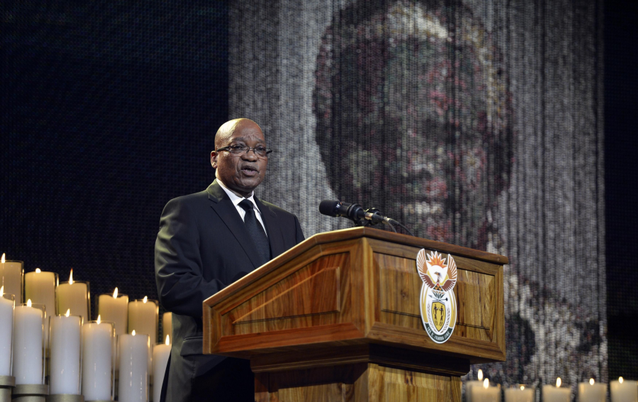
President Jacob Zuma speaks during the funeral ceremony for former president Nelson Mandela in Qunu on Sunday. Picture: REUTERS
SUNDAY marked the end of a 95-year journey for former president Nelson Mandela, President Jacob Zuma said at his state funeral in Qunu in the Eastern Cape.
"It is the end of 95 glorious years of a freedom fighter, a dedicated, humble servant of the people of South Africa, a fountain of wisdom, a pillar of strength and a beacon of hope," he said. "We are truly honoured to be part of the final journey of this great son of our country and the founding president of a free and democratic South Africa."
He said that when Mandela became critically ill last year, people had not wanted to confront the reality of his mortality, which had now come to pass.
"Tata, it has been a long, painful week for us, your people, your comrades, your relatives and your friends, since you took your last breath on December 5," Mr Zuma said.
People around the country had expressed their grief in various ways. "What truly stands out is the spectacular display of admiration by the thousands that descended on the Union Buildings to spend just one minute with you as you lay in state."
Mourners had lined the streets of Pretoria on Wednesday, Thursday and Friday, some silent, some singing and some crying.
"We wish today to express two simple words," said Mr Zuma. "Thank you. Thank you for being everything we needed and wanted in a leader during a difficult period in our lives."
Mr Zuma undertook to take forward Mandela’s legacy, saying the late leader had made tremendous strides in gender equality, giving it prominence and seriousness under his presidency.
"(This led) to an increase in the number of women in public office, especially Parliament and Cabinet," he said. "We dare not reverse your achievements in this regard.
"As your journey ends today, ours must continue in earnest. One thing we can assure you today, Tata, as you take your final steps, is that South Africa will continue to rise."
The president said South Africans could not rest until the poor and working class had truly benefited from the fruits of freedom and democracy for which Mandela had fought.
"Therefore, today we undertake to take forward the (promise) of an improved quality of life for all," Mr Zuma said. "We commit to work more intensely to deal a decisive blow against persisting poverty, unemployment, and inequality.
"We pledge to take your vision forward for good schools, hospitals, quality housing, utilities, decent jobs and working conditions, as well as efficient and accountable public service."
On Thursday, speaking at a memorial at the University of the Witwatersrand in Johannesburg, veteran human rights advocate George Bizos said: "Who do our leaders think they are kidding when they tell us they are following in Madiba’s footsteps?"
To tumultuous applause, Mr Bizos ended his address with this warning. He did not mention names, but his previous sentence referred to Mandela’s instructions that a third of his presidential salary be given to charity.
On Sunday, Mr Zuma started his speech by singing a struggle song about land stolen from black people, and many in the audience joined in. Archbishop Emeritus Desmond Tutu was among those who stood for the duration of the song.
Before Mr Zuma spoke, his praise singer Zolani Mkiva raised eyebrows by urging those present to sit and be respectful. Usually a praise singer goes straight into introducing an important person and does not need to tell the audience how to behave.
Earlier this week, at the FNB Stadium in Johannesburg where an official memorial was held for Mandela, Mr Zuma was booed by parts of the crowd in an embarrassing moment for the African National Congress (ANC).
Although Mr Mkiva spoke mostly in isiXhosa, foreign dignitaries smiled and clapped during his performance. Britain’s Prince Charles laughed and chatted to those near him.
Kaunda on stage
Former Zambian statesman Kenneth Kaunda made an unexpected appearance on stage during the funeral on Sunday.
After Mr Zuma’s speech, Mr Kaunda jogged up onto the stage and started talking.
According to the programme, Mr Zuma was to be the last dignitary to speak, followed by a sermon and benediction by Rev Ziphozihle Siwa and a military ceremony before the casket could be moved to the gravesite.
Loud laughter was heard when Mr Kaunda referred to the apartheid-era National Party as the "Boer" party. While serving as Zambian president, he had been the leader of the frontline states that supported the ANC in its fight against apartheid.
His sudden appearance placed some time constraints on the service. According to Xhosa tradition, the body must be buried by noon. ANC deputy president and master of ceremonies Cyril Ramaphosa walked up to the podium to signal to him to wrap up.
Mr Kaunda had the audience giggling when he protested, saying people were "trying to control an old man who fought the Boers".
Mr Ramaphosa apologised to Mandela’s clan, the AbaThembu, for the unannounced change in the programme.
Mandela family friend Bantu Holomisa gave wide-ranging thanks to those who had arranged the funeral service. People began leaving the domed venue shortly after 11am in preparation for the burial ceremony.
With Sapa, Paul Vecchiatto and Sue Blaine


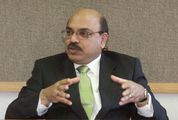

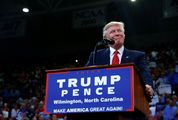
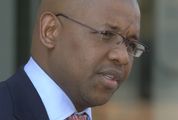




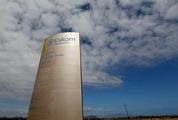
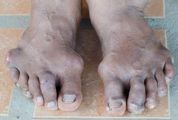
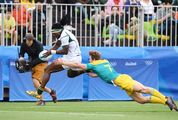
 News and views on the death, and life, of former president Nelson Mandela, with tributes and photographs
News and views on the death, and life, of former president Nelson Mandela, with tributes and photographs








